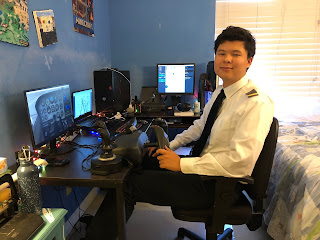 |
| Wildfire smoke |
Misa enjoyed staying home and made high-fashion face masks for us. She also sold them in her Etsy Store.
Max studied day and night, took a college board test and managed his worry about school and future. Some of his friendships grew through separation this year. He began learning to drive, and that’s one activity that helps him cope with the extra restrictions everywhere else. He also flew high in his computer flight simulator.
My eternal picture continued to develop, mirroring the pace of the carving of the Grand Canyon. I hope to show you more expansive completion next year.
The rest of our challenges produced no stories to share, even though they consumed vast time and energy. Family members went into quarantine. We worried about the direction of the country and the world, then hoped for the success of the vaccines. We appreciate the bravery of our front-line caregivers and hope for their relief from danger and overwork.
We can’t be together, but perhaps we can exchange thoughts as we digest this complicated year. I think the first thought is grief, for the lives we have lost, the careers, the businesses, the fearful and disappointing struggles played out in our country.
One thing I want when grieving is to share that grief with others and to remember the suffering of other people. What happened to them, and how did they endure?
Daniel Defoe wrote a book about a biological catastrophe that struck London in the year 1665, titled, A Journal of the Plague Year. Though he wrote the book much later than the events it records, Defoe knew many people who lived through that time. His uncle, Henry Foe, kept a journal, which may have served as source material.
Fear and grief paralyzed the population. Defoe’s narrator watched sadly, as people abandoned their reason, just when it was most needed.
Defoe wished, as I do, that we could learn from suffering and redeem ourselves by improved behavior. When the plague exhausted itself and life returned to normal, he looked for signs of a better civic life to come. The signs were mixed, however.
I wish I could say that as the city had a new face, so the manners of the people had a new appearance. I doubt not but there were many that retained a sincere sense of their deliverance, and were that heartily thankful to that Sovereign Hand that had protected them in so dangerous a time; it would be very uncharitable to judge otherwise in a city so populous, and where the people were so devout as they were here in the time of the visitation itself; but except what of this was to be found in particular families and faces, it must be acknowledged that the general practice of the people was just as it was before, and very little difference was to be seen.
 Some, indeed, said things were worse; that the morals of the people declined from this very time; that the people, hardened by the danger they had been in, like seamen after a storm is over, were more wicked and more stupid, more bold and hardened, in their vices and immoralities than they were before; but I will not carry it so far neither. It would take up a history of no small length to give a particular of all the gradations by which the course of things in this city came to be restored again, and to run in their own channel as they did before.
Some, indeed, said things were worse; that the morals of the people declined from this very time; that the people, hardened by the danger they had been in, like seamen after a storm is over, were more wicked and more stupid, more bold and hardened, in their vices and immoralities than they were before; but I will not carry it so far neither. It would take up a history of no small length to give a particular of all the gradations by which the course of things in this city came to be restored again, and to run in their own channel as they did before. |
| Stan Rogers |

For those who are ready to look ahead and hope for redemption, I share another of Stan’s songs, The Mary Ellen Carter.













1 comment:
We had covid this year and it was hard but an amazing thing happened, joy and appreciation for each other and our health. Sometimes you need to lose to gain. It also reminded me that I'm not in control and in releasing my illusion of control, I'm liberated. God is in control, so freeing. If you want to grab a walk someday let me know. Blessings,
.....dp
Post a Comment